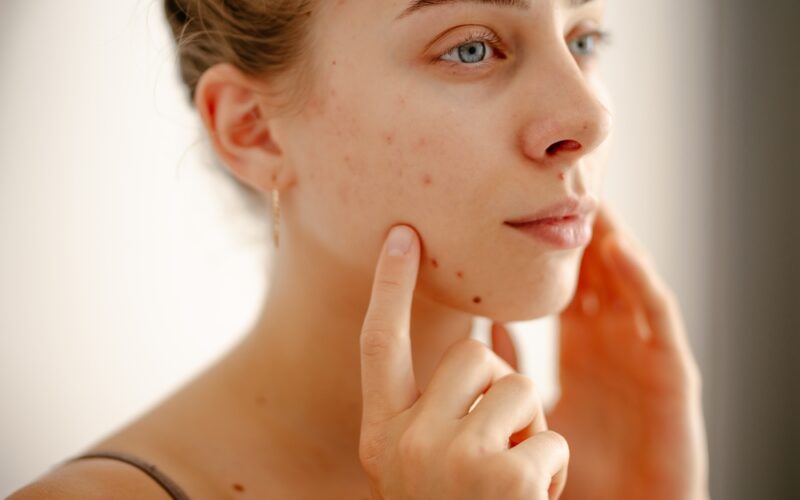PCOS is characterized by elevated androgens (male hormones) in women. These hormones stimulate sebaceous glands to produce more oil, leading to clogged pores and acne, particularly on the jawline and chin. The same hormones trigger increased hair growth in typically male-pattern areas. Insulin resistance, common in PCOS, further promotes inflammation and stimulates more androgen production, creating a challenging cycle.
Best Skincare Ingredients for PCOS Acne
Retinoids
Retinoids accelerate cell turnover, reduce inflammation, and decrease oil production. Both prescription (tretinoin, adapalene) and over-the-counter options help with hormonal acne PCOS, though start with lower concentrations to minimize irritation.
Salicylic Acid and Benzoyl Peroxide
Salicylic acid penetrates pores to exfoliate and reduce inflammation—look for 1-2% leave-on products. Benzoyl peroxide kills acne bacteria and reduces inflammation, with 2.5-5% concentrations typically sufficient.
Niacinamide and Azelaic Acid
Niacinamide reduces inflammation and regulates oil production. Azelaic acid is particularly beneficial for PCOS as it reduces inflammation and may help reduce facial hair growth. Available in prescription (15-20%) and over-the-counter (10%) strengths.
Building an Effective Daily Skincare Routine
A consistent skincare routine for PCOS should be simple yet effective. Morning: gentle cleanser, treatment products (salicylic acid, azelaic acid, or niacinamide), non-comedogenic moisturizer, and SPF 30+. Evening: thorough cleansing, retinoid treatment (starting 2-3 times weekly), and hydrating moisturizer.
Key principles include consistency over complexity, gentle cleansing, avoiding over-exfoliation, ensuring proper hydration even for oily skin, and patience—most treatments take 6-12 weeks to show results.
Professional Treatments to Consider
When at-home care isn’t sufficient, professional options can enhance PCOS acne treatment. Chemical peels with professional-strength acids penetrate deeply to clear pores. Light and laser therapies target bacteria and reduce scarring. Professional extractions safely clear clogged pores.
For severe cases, prescription medications like spironolactone (blocks testosterone effects), certain birth control pills (reduce androgen levels), or isotretinoin may be necessary.
Managing Hair Growth: Options Beyond Shaving and Waxing
For PCOS hair growth management, several options provide longer-lasting results than temporary methods. PCOS and laser hair removal works best for dark hair on lighter skin, though newer technologies accommodate more skin tones. Multiple sessions are required, with maintenance treatments needed due to hormonal influence.
Electrolysis provides permanent hair removal by destroying individual follicles regardless of hair color or skin tone. Medical options include eflornithine cream (Vaniqa), which slows facial hair growth, and oral medications like spironolactone or hormonal contraceptives. The most effective approach often combines hormonal treatments with direct hair removal.
How Diet and Hormones Impact Your Skin
Diet significantly influences PCOS skin symptoms. Insulin resistance exacerbates hormonal imbalances, while high-glycemic foods spike insulin and potentially increase inflammation and androgen production. Focus on lower-glycemic foods, include protein and healthy fats with meals, and stay hydrated.
Some find dairy increases acne severity. Anti-inflammatory foods like omega-3 rich options and colorful produce may help. Natural remedies for PCOS skin include supplements like inositol, zinc, omega-3s, and vitamin D. While dietary changes complement medical treatments, they aren’t replacements for proper skincare and professional care.
Boosting Skin Confidence While Managing PCOS
The emotional impact of visible PCOS symptoms like acne and excess hair can be significant. Here are some PCOS self-confidence tips for navigating the psychological aspects:
Prioritize progress over perfection: Document your skin’s improvement with photos taken in the same lighting. Even modest improvements are worth celebrating.
Find supportive communities: Connect with other women with PCOS through online forums or support groups. Sharing experiences can reduce feelings of isolation.
Develop expertise in makeup if desired: Learning color-correcting techniques and finding the right products can help camouflage active breakouts or redness when needed for special occasions or whenever you want a confidence boost.
Practice compassionate self-talk: Remind yourself that PCOS is a medical condition, not a reflection of personal failure or lack of cleanliness.
Focus on what your body can do: Appreciate your body’s strengths and abilities rather than focusing exclusively on appearance.
Work with mental health professionals if needed: If skin concerns are causing significant distress, anxiety, or depression, consider speaking with a therapist who understands the psychological impact of chronic visible conditions.
Remember that managing PCOS is a marathon, not a sprint. Combining the right skincare regimen, medical treatments, lifestyle modifications, and emotional support creates a comprehensive approach to feeling your best.
At Heally, we understand the unique challenges of managing PCOS skin and hair symptoms. Our healthcare providers can help create a personalized treatment plan that addresses both the visible symptoms and the underlying hormonal imbalances. Schedule a consultation today to take the first step toward clearer skin and greater confidence.
Sources
Verywell Health: What to Know About PCOS Acne
NIH: The latest reports and treatment methods on polycystic ovary syndrome
MedicalNewsToday: What to know about PCOS, acne, and acne treatment
Healthline: Polycystic Ovary Syndrome (PCOS) and Acne: Connection, Treatment, and More

